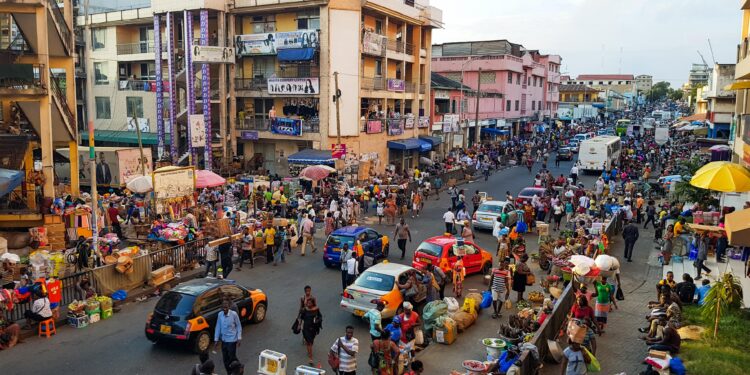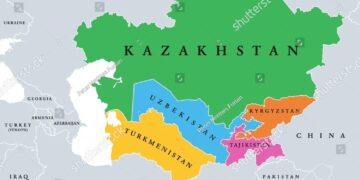Accra’s Pavements Reclaimed by Street Vendors Despite AMA’s Decongestion Drive
Accra, Ghana – In a vivid testament to the tenacity of informal traders, many street vendors in Accra have resumed their operations on sidewalks, challenging the recent decongestion campaign spearheaded by the Accra Metropolitan Assembly (AMA). The AMA’s initiative aimed to clear pedestrian walkways and improve traffic flow by relocating sellers to designated market areas. Yet, numerous vendors have reverted to their original pavement locations, prioritizing customer accessibility over municipal restrictions. This development spotlights the ongoing tension between urban management efforts and the economic realities faced by street traders in Ghana’s capital city.
Vendors Reclaim Sidewalks Amidst AMA’s Decongestion Measures
Despite persistent enforcement attempts and public awareness campaigns launched by the Accra Metropolitan Assembly (AMA), street vendors are steadily reoccupying pavements across key commercial districts. This resurgence undermines efforts designed to unclog pedestrian routes and ease vehicular congestion—a challenge not unique to Accra but shared globally among rapidly urbanizing cities. For instance, Ho Chi Minh City recently allocated $40 billion towards clearing obstructed streets as part of its urban renewal strategy.[1] Similarly, Accra faces a complex balancing act between fostering entrepreneurship and maintaining orderly public spaces.
Several factors contribute significantly to this phenomenon:
- Economic Imperatives: Many traders depend heavily on high foot traffic for daily earnings; relocating away from busy streets threatens their income stability.
- Inadequate Market Infrastructure: The scarcity of well-equipped alternative marketplaces forces many sellers back onto sidewalks where customer access is optimal.
- Community Preferences: Local shoppers often favor convenient street-side purchases over traveling longer distances to formal markets.
| AMA Challenges | Consequences for Traders |
|---|---|
| Poor Enforcement Mechanisms | Sellers feel emboldened due to minimal risk of penalties or eviction. |
| Lack of Adequate Market Facilities | Crowding within existing markets leads some traders back onto pavements seeking better visibility. |
| Limited Public Awareness Campaigns | Consumers often prioritize convenience over compliance with regulations. |
How Pavement Vending Influences Urban Movement and Economic Activity in Accra
The persistent occupation of pavements by informal vendors presents multifaceted challenges impacting both mobility within city centers and local economic dynamics. Pedestrian pathways become congested as stalls encroach upon walkways, compelling pedestrians into roadways that disrupt vehicle flow—exacerbating traffic delays during peak hours. Such obstructions can increase average commute times substantially; studies indicate that congestion-related delays cost African cities billions annually in lost productivity.[2]
Moreover, these blockages affect residents’ perceptions regarding safety and accessibility in public spaces—potentially diminishing quality of life for commuters who rely on unobstructed thoroughfares.
Conversely, pavement trading injects vibrancy into neighborhoods while providing essential goods at affordable prices directly accessible within communities. The sector supports livelihoods for thousands who might otherwise face unemployment or underemployment.
| Economic Contributions | Description & Impact | ||||
|---|---|---|---|---|---|
| Sustained Employment Opportunities | The informal trade sector remains a critical source of jobs amid limited formal employment options, bolstering local economies. [3] |
||||
| Strategy Implemented | Expected Benefits < / tr > < / thead > |
|---|---|
| Inclusive trader engagement sessions | Builds trust leading toward voluntary regulation adherence < / tr > |
| Scheduled market days allocation | Diminishes sidewalk overcrowding enhancing orderliness Engagement with trader cooperatives Increases accountability & resource sharing Investment in mobile stalls Flexibility without permanent obstruction Future Perspectives on Balancing Economic Vitality with Urban Order in AccraThe recurring return of sidewalk vendors despite concerted decongestion drives highlights an intricate challenge at the intersection of economic survival strategies and urban governance frameworks. While AMA’s initiatives aim at creating safer, more navigable cityscapes, the persistence of informal trade underscores deep-rooted socio-economic dependencies that cannot be overlooked. Going forward, a multi-pronged approach emphasizing collaboration between policymakers, sellers, and community stakeholders will be crucial. Such partnerships could foster innovative solutions that uphold both vibrant economic activity and orderly public spaces — ensuring sustainable growth aligned with residents’ diverse needs. Ultimately, navigating this delicate balance will define how effectively Ghana’s capital harmonizes modernization ambitions alongside inclusive prosperity.
| .
.
.













